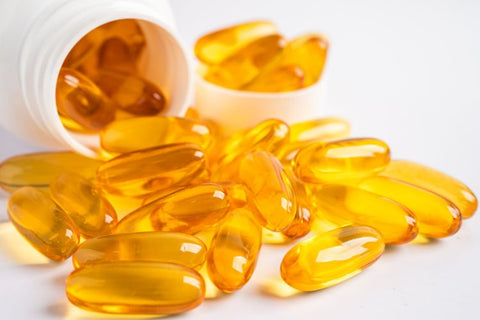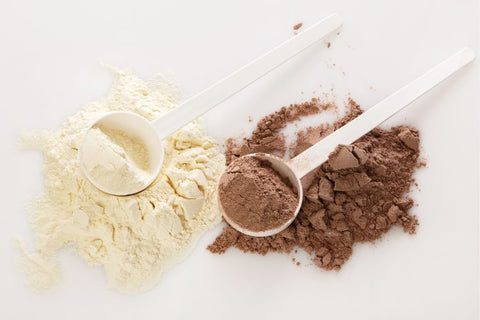Just think about what life could be like with sharper thinking, more focused attention, and if you had more energy to burn. Does the prospect sound appealing? It certainly should. If it resonates with you, contemplating the incorporation of a DHA supplement into your routine could be a beneficial step toward enhancing your overall health and well-being. This article will discuss in-depth what DHA is, how important it is for your brain, and the supplements you can use to keep your mind fresh and healthy.
What is a DHA?
DHA, or docosahexaenoic acid, is a type of omega-3 fatty acid. You can find it in fish like salmon and even in seaweed. Our body makes a bit of DHA on its own, but you can also get it from supplements. DHA is really important for the part of our brain that helps with things like remembering stuff, talking, being creative, making good decisions, feeling emotions, and staying focused.
Importance of DHA for Brain Health
DHA plays a vital role in brain development and function throughout life. Here's how:
- Brain Structure: DHA makes up about 20% of the fatty acids in the brain, forming the building blocks of brain cell membranes. This structure is essential for optimal signal transmission between neurons, supporting memory, learning, and cognitive function.
- Cognitive Development: DHA is especially important for brain development in infants and young children. Adequate DHA intake during pregnancy and early childhood has been linked to improved cognitive skills, attention, and problem-solving abilities.
- Brain Aging: DHA may help protect against age-related cognitive decline and neurodegenerative diseases like Alzheimer's and dementia. Studies suggest that higher DHA levels in the brain are associated with a lower risk of these conditions.
DHA Sources in Diet
Fatty fish are the richest dietary source of DHA. Some top picks include:
- Salmon: One 3-ounce serving of Atlantic salmon provides about 1,500 mg of DHA.
- Tuna: Albacore tuna contains about 500 mg of DHA per 3-ounce serving.
- Sardines: These small fish are packed with DHA, offering about 200 mg per 3-ounce serving.
- Herring: A 3-ounce serving of herring provides around 300 mg of DHA.
- Mackerel: King mackerel is particularly high in DHA, with over 1,000 mg per 3-ounce serving. However, be mindful of mercury levels in larger fish species.
Other dietary sources of DHA include:
- Fish oil supplements: A convenient way to boost your DHA intake, but choose high-quality brands with Omega-3 Purity Certifications.
- Algae oil: A vegan source of DHA, suitable for those who don't consume fish.
- Eggs: Fortified eggs can be a good source of DHA, containing around 120 mg per egg.
- Flaxseeds and chia seeds: These plant-based sources contain alpha-linolenic acid (ALA), which our bodies can convert into small amounts of DHA.
Remember, maintaining adequate DHA levels through diet or supplements is crucial for optimal brain health throughout life.
DHA Deficiency and Cognitive Implications
Diagnosing DHA deficiency can be complex, as symptoms can vary depending on age, severity, and individual differences. However, some potential indicators include:
Symptoms of DHA Deficiency
- Delayed cognitive development, such as slower learning, speech problems, and difficulty with attention and coordination.
- Vision problems, including poor light sensitivity and delayed visual development.
- Behavioral issues like hyperactivity and mood swings.
- Mild cognitive decline, including memory problems, difficulty concentrating, and slowed processing speed.
- Mood changes like depression and anxiety.
- Increased risk of age-related cognitive decline and neurodegenerative diseases like Alzheimer's and dementia.
Impact on Cognitive Performance
DHA deficiency can negatively affect various cognitive functions, including:
- Memory: Difficulties with encoding new information, storing memories, and recalling them later.
- Learning: Increased time and effort required to learn new skills and concepts.
- Executive function: Problems with planning, organizing, and decision-making.
- Attention: Difficulty focusing and maintaining concentration.
- Processing speed: Slower reaction times and information processing.
Long-Term Consequences for Brain Health
Chronic DHA deficiency, particularly in early life, can have lasting consequences for brain health:
- Increased risk of neurodegenerative diseases: Studies suggest a link between low DHA levels and a higher risk of developing Alzheimer's disease, dementia, and Parkinson's disease.
- Poor cognitive aging: DHA deficiency may contribute to accelerated age-related cognitive decline, leading to reduced independence and a lower quality of life.
- Mental health issues: Research suggests a potential association between low DHA levels and increased risk of depression, anxiety, and other mental health conditions.
DHA Supplements: A Boost for Your Brain and Beyond
DHA supplements offer a concentrated and reliable way to increase your intake, regardless of your dietary habits. This can be particularly helpful for:
- People who don't regularly consume fatty fish, the richest dietary source of DHA.
- Vegetarians and vegans who may lack sufficient DHA sources.
- Individuals with limited seafood intake due to allergies or preferences.
- Busy lifestyles where incorporating enough DHA-rich foods can be challenging.
Supplements can effectively fill the gap for those who don't meet their daily DHA needs through diet alone. This is especially important for:
- Pregnant and breastfeeding women to support optimal fetal and infant brain development.
- Children with developmental delays or attention problems are potentially linked to low DHA levels.
- Adults at risk of cognitive decline or neurodegenerative diseases may benefit from increased DHA intake.
Making DHA a Part of Your Life: Integrating Supplements into Your Routine
Boosting your DHA intake through supplements can be a smart decision for brain health. Here's how to smoothly incorporate them into your routine:
- Doctor's guidance: Before diving in, talk to your doctor. They can assess your individual needs, recommend appropriate dosage and form, and address any potential interactions with medications you're taking.
- Nutritionalist input: Consider consulting a registered dietitian to understand how supplements can complement your existing diet and optimize your overall nutrient intake.
- Food first: While supplements can fill gaps, prioritize incorporating DHA-rich foods like fatty fish, eggs, and fortified options. Aim for at least two servings of fatty fish per week.
- Balanced approach: Supplements are not a substitute for a balanced diet. Ensure you're getting adequate other essential nutrients from fruits, vegetables, whole grains, and lean protein to support overall health.
- Patience is key: Don't expect overnight miracles. It may take several weeks or even months to see noticeable cognitive improvements from DHA supplementation.
- Track your progress: Keep a journal to document any changes in your memory, focus, mood, or learning abilities. This can help you and your doctor assess the effectiveness of the supplement.
- Stay consistent: Take your supplements as directed and at consistent times for optimal absorption and long-term benefits.
Conclusion
Incorporating a DHA supplement into your routine can significantly contribute to maintaining a healthy and vibrant mind. By understanding the importance of DHA, recognizing deficiency symptoms, and seamlessly integrating supplements, you're taking a proactive step toward optimal brain health.
FAQs (Frequently Asked Questions)
- Q: Can I get enough DHA through a regular diet without supplements?
A: It's possible to get sufficient DHA through a diet rich in fatty fish, eggs, and other sources. However, supplements can be beneficial for those who have dietary restrictions, allergies, or busy lifestyles.
- Q: Are there any side effects of taking DHA supplements?
A: Generally, DHA supplements are well-tolerated. However, it's advisable to consult with a healthcare professional before starting any new supplement regimen to ensure it aligns with your individual health needs.
- Q: How long does it take to see improvements in cognitive function with DHA supplementation?
A: Cognitive improvements from DHA supplementation may vary from person to person. It's recommended to be patient and consistent, as noticeable changes may take several weeks or months.
- Q: Can pregnant women take DHA supplements, and are they beneficial for fetal development?
A: Yes, DHA supplements are often recommended for pregnant women to support optimal fetal brain development. Consult with a healthcare provider to determine the appropriate dosage.
- Q: Are there vegetarian or vegan options for DHA supplementation?
A: Yes, algae oil is a vegan source of DHA, suitable for those who don't consume fish or animal products. It provides an alternative for individuals with plant-based diets.
Other Resources
For those who are curious, want to expand their knowledge, or just like keeping informed, here are some links to sites that you might like. These online resources come from institutions that hold a sterling reputation for their expertise and stringent standards for relevant information.
National Institutes of Health (NIH) - USA
The National Institutes of Health is a primary agency for conducting and supporting medical research. Their website provides authoritative information on various health topics, including omega-3 fatty acids and brain health.
Mayo Clinic - USA
Mayo Clinic is a nonprofit American academic medical center focused on integrated clinical practice, education, and research. Their website offers reliable health information, including articles on nutrition and supplements.
Health Canada - Canada
https://www.canada.ca/en/health-canada.html
Health Canada is the country's federal health department. Their website provides valuable health information, regulations, and guidelines, ensuring the content meets rigorous standards for accuracy and reliability.
Dietitians of Canada - Canada
Dietitians of Canada is the national professional association for dietitians in Canada. Their website offers evidence-based nutrition information, ensuring the public receives accurate guidance on dietary supplements.
Harvard Health Publishing - USA
https://www.health.harvard.edu/
Harvard Health Publishing is the media and publishing division of Harvard Medical School. Their website features expert advice on a wide range of health topics, including nutrition and supplements, providing trustworthy information for a global audience.





